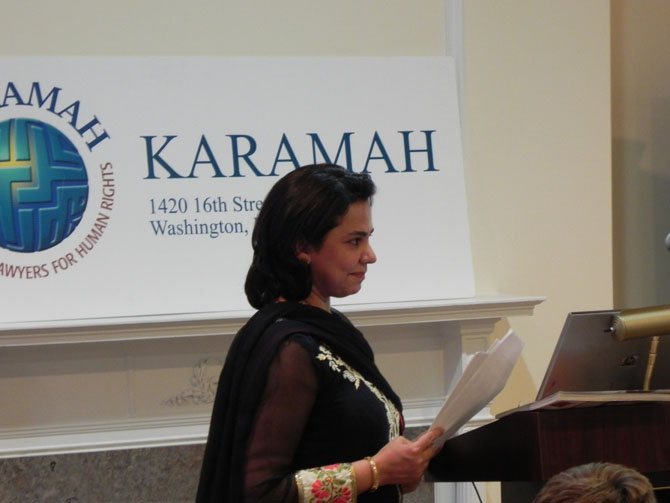Potomac’s Salma Hasan Ali has learned “the power of sharing personal stories.” “Stories humanize,” she said. “Our accountings of our past and present are unique to each of us, yet they’re universal in the emotions and feelings they stir.” Even though her journey seems quite ordinary to her, conveying her own narrative and those of others “communicates who we are and what we value.”
Ali relayed her story of immigration from East Pakistan (now Bangladesh), the challenges and blessings of raising children in a country with different cultures and customs, the struggle to maintain Muslim traditions and the joy of blending her new life with her past life at the March 13 meeting of Karamah, the Muslim Women’s Lawyers for Human Rights organization started by Dr. Azizah al-Hibri.
Ali shared with her audience that her personal stories are an effort to bridge the divides between Muslims and non-Muslims. She refers to something she once read which had a profound impact on her: “It’s hard to hate someone whose story you know.”
Ali’s narrative of her immigration and life, “Pakistan on the Potomac” was published in the December 2008 issue of Washingtonian magazine. A graduate of Columbia University, Ali initiated a blog during Ramadan (30days30deeds.com), serves as a contributing editor for The Islamic Monthly, volunteers as chief inspiration officer of MoverMoms and has traveled with and written the stories of many inspirational leaders, including Todd Shea, an American who has committed his life to providing healthcare in remote areas of Kashmir and Shaukat Ali, a math and science teacher at one of the girl’s schools that Greg Mortensen built in Pakistan. She is married to Arif Ali and has two children, Saanya, age 15 and Zayd, age 10.
“One’s own personal story is very instrumental in connecting people. We are all different, but we have many similar experiences. After my article in Washingtonian, I received e-mails that conveyed that many immigrants have had similar experiences. Stories help us cultivate a relationship. They help us develop trust with one another and build a sense of familiarity.” Ali fears if we don’t relate our own stories, other people will write our narrative.
She started noting her own stories and those of others with the intention of “helping to broaden the conversation so people could see us beyond generalizations, beyond stereotypes and simply get to know us as families, as neighbors, as friends.”
Ali and her family immigrated to the U.S. when she was seven years old. When they landed at John F. Kennedy International Airport in New York City, her father asked a random taxi driver for advice on which neighborhood in the city would be suitable for his family – and thus, their “fate rested in the hands of a New York City cab driver from China.” He took them to a motel in Flushing N.Y., an area with many new immigrants. The family assimilated, yet maintained their Pakistani traditions while learning American customs and the English language. After four years, the family moved to Tenafly, N.J., bought a home and car and lived the American Dream.
Life before 9/11 was different from life after for American Muslims, and Ali is hoping that her stories will dispel misconceptions. “Those of us for whom America has become home recognize that taking part in the mainstream of life culturally, socially, religiously and politically is the best way to overcome negative stereotyping.”
“We all have tremendous stories — stories of faith and family, of friendship and joy, pain and compassion and extraordinary beauty. There is so much that we have to be proud of. We just need to open up and share … because stories humanize.”
Ali’s goal is to write a book of stories to highlight profiles of commitment by Muslims. She can be reached at salmahasanali@yahoo.com.
